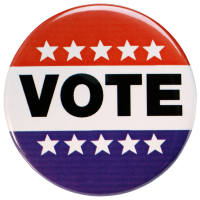
Since 2004, I have published political endorsements—and an occasional non-endorsement—on Off on a Tangent for every election in which I am eligible to vote. This year will be no different. In September (exact dates to-be-determined), I will be posting endorsements for four Loudoun County bond referendums, two Virginia constitutional amendments, Virginia’s 10th District in the U.S. House of Representatives, and President of the United States.
In addition, on the evening of November 8, I will continue my tradition of providing live election night coverage. This will include detailed results for those races, and a liveblog with information about these and other newsworthy races around the country. For the presidential race, I will be providing an electoral college count (with color-coded map) and also detailed results specific to Virginia.
As in the past, I will use my own proprietary method for making election calls. Usually I make calls roughly around the same time that the major media outlets do, but occasionally I beat them to the punch. And occasionally I hold-out longer than the media if I don’t think the data supports a call. My method has only failed once . . . and even then, it didn’t really fail.
Lastly, I want to mention a small (but important) change to Off on a Tangent policy. My previous policy with regard to endorsements was to review candidates in the following order: 1. Incumbents (if any); 2. Major party (Republican and Democratic) candidates, alphabetized by last name; 3. Third-party and independent candidates alphabetized by last name.
This ordering was not satisfactory in some cases. It unfairly gave preference to the Republican and Democratic parties, which are private organizations that ought to have no official standing in our political system. I have revised the policy to order candidates based on expected performance instead of party affiliation: 1. Incumbents (if any); 2. Major candidates, alphabetized by last name; 3. Minor candidates, alphabetized by last name. Any candidate expected to receive five percent or more of the popular vote in a particular race will be categorized as a major candidate, and any candidate expected to receive less than five percent will be categorized as a minor candidate.
In practice, this won’t be a big change; in most races only Republicans and Democrats poll at five percent or higher. But in several recent (and upcoming) races, Libertarian candidates have managed to break that threshold. When they (or others) do, I will include them in my coverage and endorsements on even-footing with the other major candidates.
